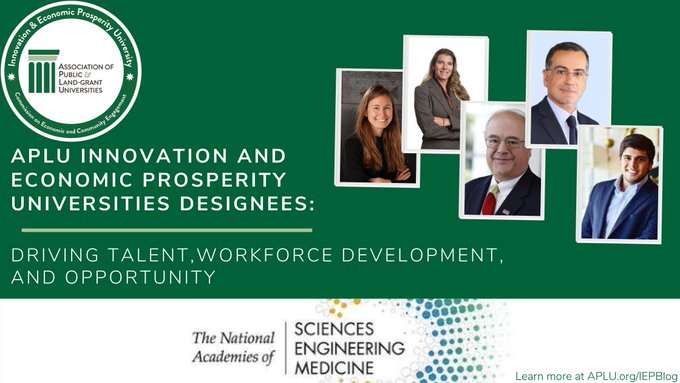Source: Association of Public and Land-grant Universities (APLU)
By Abigail Robbins, Innovation and Economic Prosperity and Governmental Affairs Associate, APLU
 On Tuesday, September 15th, APLU and the National Academies of Sciences, Engineering, and Medicine hosted a web panel titled, “APLU Innovation and Economic Prosperity Universities Designees: Driving Talent, Workforce Development, and Opportunity.” The web panel was introduced by Shalin Jyotishi, Assistant Director, Economic Development & Community Engagement at APLU, and IEP Program Director. In his opening remarks, Jyotishi gave an overview of the IEP Designation program and emphasized that participation in IEP strengthens an institution’s ability to better know, measure, and tell its economic development and community engagement impact and enhance its long-term strategy for university economic and community engagement. Megan Nicholsen, Program Officer, Government-University-Industry Research Roundtable (GUIRR) at the National Academies of Sciences, Engineering, and Medicine, moderated the web panel.
On Tuesday, September 15th, APLU and the National Academies of Sciences, Engineering, and Medicine hosted a web panel titled, “APLU Innovation and Economic Prosperity Universities Designees: Driving Talent, Workforce Development, and Opportunity.” The web panel was introduced by Shalin Jyotishi, Assistant Director, Economic Development & Community Engagement at APLU, and IEP Program Director. In his opening remarks, Jyotishi gave an overview of the IEP Designation program and emphasized that participation in IEP strengthens an institution’s ability to better know, measure, and tell its economic development and community engagement impact and enhance its long-term strategy for university economic and community engagement. Megan Nicholsen, Program Officer, Government-University-Industry Research Roundtable (GUIRR) at the National Academies of Sciences, Engineering, and Medicine, moderated the web panel.
The web panelists included leaders from IEP designated and award-winning institutions including, Ashley Stokes of Colorado State University, Ahmad Ezzeddine of Wayne State University, and David Spalding of Iowa State University. Each panelist shared how pursuing the IEP Designation is integral in understanding, measuring, and communicating how their institution drives talent, workforce development, and opportunity.
Ashley Stokes, Associate Vice President for Engagement and Extension at Colorado State University (CSU), spoke about utilizing the power as a land-grant institution to become an economic driver for the community and contributor to global research. Stokes emphasized research, engagement, academics as the triad of factors that influence workforce development. These factors frame educational structures at CSU to prepare students for the workforce and contribute to regional economies. Stokes also noted the importance of non-degree and extension programs as opportunities for universities to become economic drivers through soft skill and workforce development diversification. Three examples given from CSU include SPUR, the Family Leadership Training Institute, and Campus Connections. These initiatives increase civic engagement, innovation, and workforce development through access to new opportunities.
Ahmad Ezzeddine, Associate Vice President for Educational Outreach and International Programs at Wayne State University (WSU), spoke about the role universities have in transforming communities like Detroit through workforce and talent development opportunities. As WSU celebrated its role as part of the Nobel Prize-winning scientific team for Higgs discovery in 2013, the city of Detroit declared bankruptcy. WSU leaders understood the unique positioning it had to help their community. Ezzeddine illustrated initiatives WSU began and strengthened in response to the immense economic hardship Detroit experienced. These include Detroit’s entrepreneurship hub, Techtown, the Heart of Detroit Tuition Pledge, and the Harris Literacy Program, which won the IEP Talent Award in 2019. In light of COVID-19, these initiatives adapted to community needs, as Techtown aided small businesses through creating a stabilization fund, and the Harris Literacy Program shifted to focus on digital literacy. These economic development initiatives increased access to skill and workforce development opportunities for WSU students and community members alike.
David Spalding, Dean of the Ivy College of Business and Interim VP of Economic Development and Industry Relations at Iowa State University (ISU), spoke about the importance of a 4-year degree in developing a talented workforce. Spalding emphasized that career readiness and innovation-focused programming that is responsive to industry need prepares students to positively contribute to the workforce upon graduation. ISU launched the Innovate at Iowa State campaign that focuses on preparing students for the workforce in an ecosystem with innovation and entrepreneurship embedded into the curriculum. ISU’s Pappajohn Center for Entrepreneurship emphasizes the importance of experiential learning through the CYstarters, CyBIZ lab, ISU Startup Factory, and opportunities to connect with corporate innovators, entrepreneurs, and corporate executives.
During the question and answer period, the panelists discussed challenges and how their institutions overcame them effectively. Each panelist acknowledged a pull on financial resources and time constraints. The strategies to overcome these challenges came as a direct result of the strategic planning process including, in-depth reflective feedback from internal and external stakeholders, increased buy-in from institution leadership, talent development needed to execute growth and improvement initiatives, and building successful partnerships within the community. Each panelist recognized the cultivation of these strategies during the processes of earning the IEP Designation and competing for IEP Awards.
Inspired by what you’ve read here? APLU is now seeking presidents and chancellors to submit their letters of intent to engage their institution in APLU’s IEP Universities designation program. Intent letters are due by October 30. Learn how to engage with IEP at www.APLU.org/SeekIEP. Learn more about the Academies of Sciences, Engineering, and Medicine at https://www.nationalacademies.org.
This article is included as part of APLU’s Innovation and Economic Prosperity Universities Designation Perspectives Blog. Read other articles around strategies, programs, and impact of APLU’s IEP designees at www.APLU.org/IEPBlog.

Recent Comments